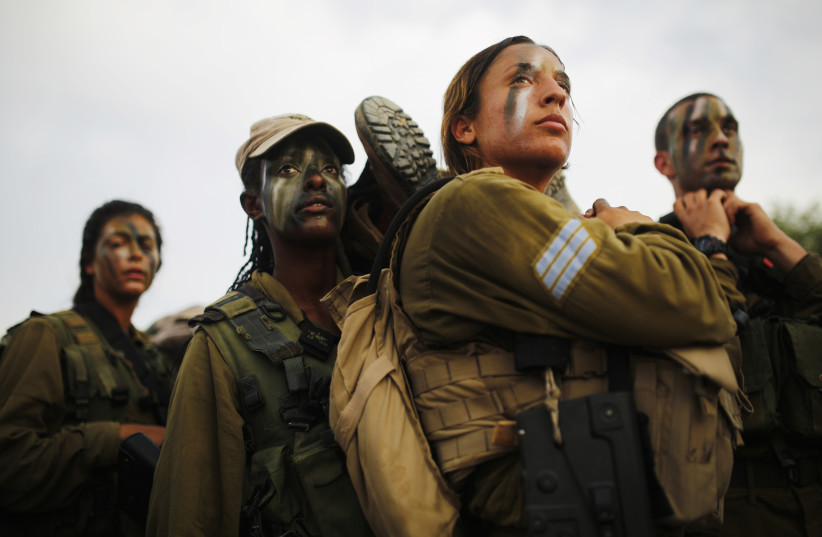Three petitions arguing to open more IDF special and frontline combat units to female soldiers were heard before the High Court of Justice on Tuesday.
The petitioners argued that women were able to meet the demands of a wide variety of heavy infantry and special units, and that by merit of equality, the law demanded that women be admitted. They argued that the pool of those chosen to serve in the units was small, but that the candidate options could be expanded by allowing women to enter the try-outs.
The military had extended pilot integration programs for the Yahalom special combat engineering unit and the 669 search and rescue unit, but petitioners called for the eventual opening of all units to women.
"We say that it needs to be in all units," an attorney for the petitioners, but said that they didn't expect this to happen in one day. That said, petitioners wanted to see some immediate improvement, not only small measures three years down the line. They argued that armor had already done enough pilots and should begin integration. "Why not Matkal?"
High Court president challenged the military, 'Why?'

High Court president Esther Hayut challenged the military on why the pilots wouldn't be applied to all special forces. The court asked why pilots should be done in intervals and steps for special forces, and if one pilot could inform results for other units -- after all, often special forces candidates fall out from the curriculum into other units. Hayut asked the military why all units with entry tests should not also be prepared to screen women if they already have the system in place.
"Is it not legitimate to do a pilot?" Hayut asked about units like Duvdevan, submarines, and some intelligence units. "If there is already a principle to accept women in some special forces, why not all of them?"
For some heavy infantry and armor, there are no entry tests, and a wide variety of Israeli males are recruited into the brigades. Some of the men are suitable, some are not, said the court. It was questioned what restricted women if there were no suitability tests, besides the need to volunteer more service time. The military argued that men had been known for decades to broadly pass the physiological thresholds for these units, which cannot be said for women.
The respondents said that it wasn't possible to open pilots for every unit, not just in terms of resources, but also due to limitations of the review team to manage and monitor the programs.
Pilot programs had been opened for units in which the military knew that there would be success. Some past pilots had seen female candidates needlessly injured. There are different physical demands for different units, and different physiological thresholds for men and women.
The military took into consideration the pilots for certain units when reviewing others but exact comparisons were not possible. While Yahalom is considered a special forces unit, it doesn't necessarily mean that it has the same physical demands in certain fields as other special forces or heavy infantry units. With combat engineering special forces there could be drop down to relevant units as men do.
The court noted that there were also integration problems in the US military, and that Israel should learn from those failures. In April the IDF said in response to the petitions that physiological criteria prevented women from serving in units that required being repeatedly burdened with heavy equipment for long periods of time and distance, such as most positions in the IDF's main infantry brigades. Women were subject to a significantly greater risk of injury under such conditions.
The respondents said that over the years, many more positions had been opened to women to allow them a meaningful service, and the contributions of anyone seeking to serve were appreciated. Each year, the military said that 669 saw 50 suitable female candidates per year. The military has said that it expects to open more special forces units to women. Analysis by the IDF had previously shown that women could serve in particular positions in frontline infantry such as on mortar teams.
One of the petitioners was a pilots' course candidate who dropped down to a classified air force position but had requested to apply to special forces. Another saw an intelligence officer seeking entry into the Duvdevan urban commando unit. She wanted to drop down from the naval officers' program, which often saw failed candidates go to special forces units.
